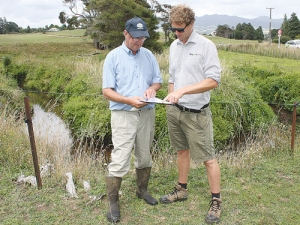DairyNZ Levy Vote Underway as Chair Highlights Seven-Fold Return
Voting has started for the renewal of DairyNZ's milksolids levy.
 DairyNZ developer Matt Highway has been trialling the Riparian Planner with farmers. He is pictured with Waikato farmer John Bluett.
DairyNZ developer Matt Highway has been trialling the Riparian Planner with farmers. He is pictured with Waikato farmer John Bluett.
Dairy farmers in 2013 committed to the Sustainable Dairying: Water Accord which requires them to have a riparian management plan by 2020.
By 2017, they are required to exclude stock from all waterways wider then 1m and deeper than 30cm.
Now a new DairyNZ online 'Riparian Planner' provides farmers with an easy, inexpensive solution to riparian management.
The Riparian Planner enables a farmer to create an online farm-specific riparian management plan. This outlines costs, to help prioritise fencing, planting, maintenance and managing riparian zones.
DairyNZ senior developer Matt Highway is trialling the Riparian Planner with farmers.
"A riparian plan can be rolled out over a few years, so by planning now and taking a long-term approach to riparian zones farmers can budget in changing times," says Highway.
"There is a lot of pressure on farmers now but I continue to see good work by dairy farmers managing their waterways. Farmers tell me they appreciate the tool's simplicity and accuracy, and being able to work within their budget."
A plan takes no more than one hour to complete, depending on its complexity and how the riparian zone will be managed.
Having a plan should reduce the risk of planting in the wrong place, at the wrong time or spending too much.
Once completed, the plan includes costs, actions and a timeline, a plant list, a map and details on how much fencing to buy, where to plant, site preparation and pest control.
The tool's map feature makes planning easy. Simply enter the farm's supply number and zoom in on the property to mark out existing waterways including lakes, ponds, streams, rivers and drains. Select each waterway's current state by width, the area fenced off and vegetation type, then tick if it has weeds, exotics, natives or grass.
Finally, select whether each waterway is fully or partially fenced and choose what to achieve over the next one to five years, whether you plant or use grass to filter overland run-off.
As the riparian zone develops or anything changes on-farm, revisit the Riparian Planner to update details for further planning.
A riparian management plan takes pressure off the farm business and protects waterways. Riparian zones help filter out sediment and nutrients before they enter waterways, prevent land erosion and increase habitat for native wildlife.
By setting a planting plan through the Riparian Planner, management can be financially viable and done within time constraints.
The planner was developed by DairyNZ and Landcare Research, with input from regional councils and environmental experts. The project is funded through the Transforming the Dairy Value Chain Primary Growth Partnership.
• This article was first published in Inside Dairy April 2016.
Horticulture New Zealand (HortNZ) has added its perspective to numerous primary sector voices urging the Government to strengthen its draft legislation to replace the Resource Management Act (RMA).
The Commerce Commission has finalised new information disclosure requirements for local councils and water organisations that deliver water supply and wastewater services.
Beef + Lamb NZ (B+LNZ) is calling for significant changes to the Government’s reforms to the Resource Management Act (RMA).
NZPork says the Government needs to strengthen its proposed planning laws to ensure New Zealand's pig farmers can continue to produce pork.
Good news for kiwifruit growers - a record crop with forecast per hectare returns at record levels for all fruit categories for the 2025-26 season.
As guests gathered on what is known as the Speaker's Lawn - a beautifully manicured patch of grass behind the main buildings of Parliament - to mingle and enjoy a lamb chop to celebrate National Lamb Day, the mood was very much upbeat.
OPINION: Staying with politics, with less than nine months to go before the general elections, there’s confusion in the Labour…
OPINION: Winston Peters' tirade against the free trade deal stitched with India may not be all political posturing by the…